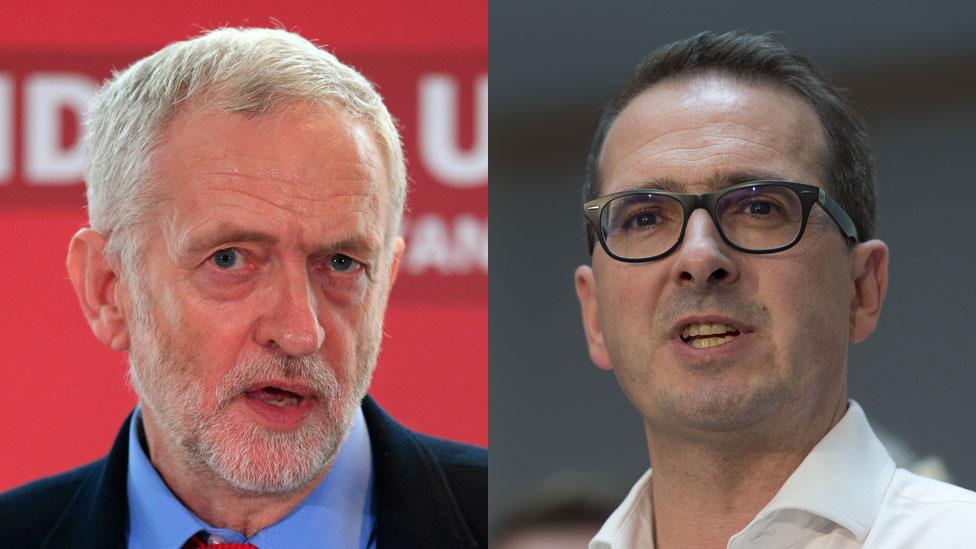Labour's lemming-like Tendency heads to the ballot box
- Published

So what sparked off Labour's lemming-like rush to pull itself apart in one of the most acrimonious leadership elections in the party's history?
And it certainly has been a no-holds-barred marathon.
Every Labour MP in South Yorkshire snubbed Jeremy Corbyn and deliberately chose to stay away from a 2000-strong rally he held in Sheffield just before the month-long ballot opened.
The next day in Halifax challenger Owen Smith told me that for the first time he was going to step up his campaign and tell his waiting audience that "Jeremy is just not up to the job".
For senior members of the same party this is pretty strong stuff.
The assembled "Corbynistas" and "Owenites" went much further.
Tory apologist or Trotskyite
Many in the crowd at the Sheffield rally told me that Welsh MP Smith was leading a right-wing coup to topple the democratically-elected leader. I didn't have to strain my ears too much to hear the words "sell-out"; "Tory apologist" and "traitor".
In Halifax, Mr Corbyn was accused of deception, deliberately ignoring a power grab by far-left Trotskyite "entryists" and destroying any chance of the party ever coming back into government.
It is the kind of slanging match I have not heard since former leader Neil Kinnock threw the far left Militant Tendency out of the party over three decades ago. Many Owen Smith supporters told me that Momentum, the internal Labour Party Group set up to support Jeremy Corbyn, is just a re-labelled Militant Tendency.
So how did it come to all this?
The tensions between left and right in the Labour Party had never gone away but until that remarkable ballot in 2015 to replace Ed Miliband as leader it was thought the left wing was little more than a powerless group of eccentric MPs - like the obscure and largely unknown MP for Islington North, Jeremy Corbyn.
His unwavering commitment to wholesale re-nationalisation; scrapping nuclear weapons and wiping Margaret Thatcher's trade union policies from the history books was seen as a throwback to the 1970s.
Labour pains
But three years before Mr Corbyn's overwhelming win a little piece of political history took place that unwittingly led to Labour's current pains.
The unlikely venue was a bar in the House of Commons and the instigator was a West Yorkshire Conservative MP who was having a quiet drink with a few colleagues.
The affable Stuart Andrew, who represents Pudsey, was head-butted when Scottish Labour MP Eric Joyce went on a drunken rampage.
Joyce was later fined for assault and stood down as an MP at the next election.
It was the scandal over choosing a replacement candidate in his Falkirk seat for the 2015 General Election that led directly to the rule changes for Labour Party internal elections which had the unintended consequence of opening the door to the rise of the left.
The trade union Unite packed the small constituency party by paying the subscriptions for new members it had recruited to ensure its own favoured candidate was selected.
Labour's response, led by the then leader Ed Miliband, was to change party rules in an attempt to ensure one powerful faction could not dominate election of MPs and party leaders.
By the time Mr Miliband himself had stood down new recruits would be included in a one-member-one-vote leadership election.
Three quid voter
He also backed incorporating the US Primary system for selecting presidential candidates where non-members could vote as long as they registered an interest in the aims of the party.
The "three quid" registered voter was born.
Unfortunately for those backing this system the new blood that flowed into the party leadership election was far redder than anticipated and went hunting a figurehead to reflect its views.
At one stage it looked as though no left-wing candidate would be able to scratch together the minimum number of MPs required which was still the first stage to allow their nomination to go ahead.
It was only because a few Labour MPs switched their votes to ensure a balanced choice was available that Jeremy Corby scraped into the contest.
The rest is history.
I spoke to Stuart Andrew last week and asked him if he knew much trouble he had caused for the Labour Party.
"A few people have mentioned that theory to me," he told me with a smile.
"I'm rather glad I'm a Conservative MP."
It is thought the vast majority of Labour MPs will not be smiling if the vast majority of its new members keep supporting Jeremy Corbyn and see him back in office when the result is announced on Saturday 24 September.